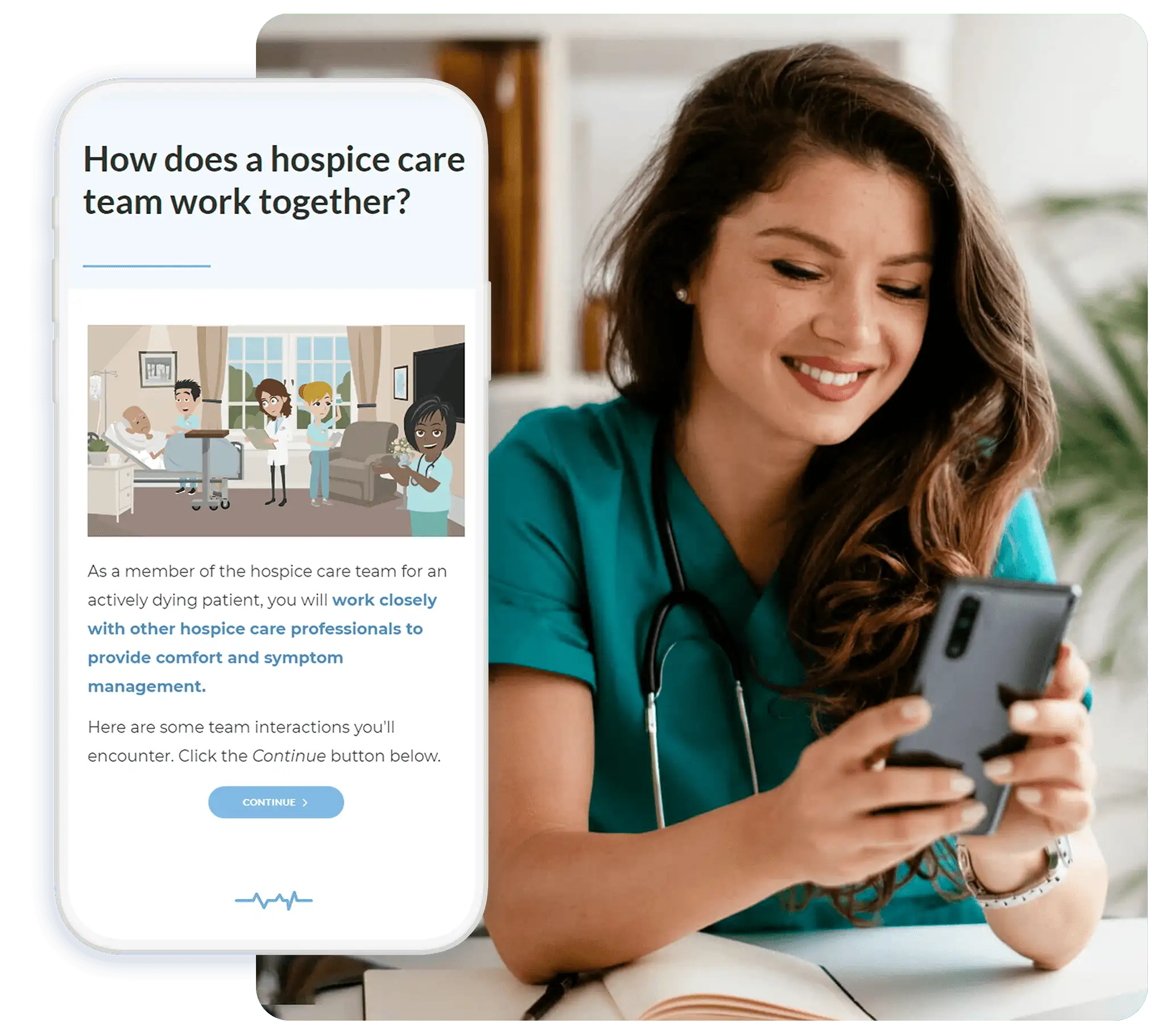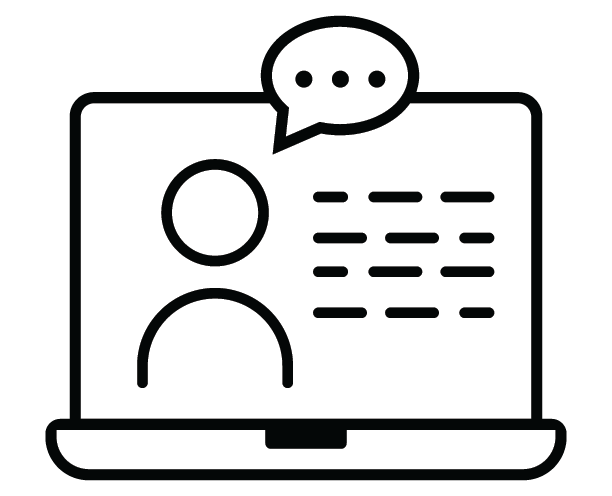Quick Guide: Caregiver Training Topics You Need to Know
Identifying suitable subjects for caregiver training can seem like maneuvering through a complicated labyrinth. Were you aware that the top 10 subjects in caregiver training range from issues like housekeeping and transportation safety to recognizing abnormal observations?
This article provides invaluable insights into essential and specialized caregiving subjects, giving you a roadmap to provide comprehensive education for your caregivers.
Ready to take your caregiver training program up a notch? Let’s dive in!
Key Takeaways
- Essential caregivertraining topics include housekeeping, transportation safety, preventing pressure ulcers, recognizing abnormal observations, and caring for clients with mental illness.
- Specialized caregiver training topics cover areas such as stroke care, preventing readmissions, helping someone with COPD, assisting someone after a heart attack, and understanding common medications.
- Effective caregiver training should offer basic programs covering a wide range of topics and provide household and safe transportation training. By offering comprehensive training programs tailored to individual client needs, caregivers can provide exceptional care.

Essential Caregiver Training Topics
In caregiver training, it is essential to cover topics such as housekeeping, transportation safety, preventing pressure ulcers, recognizing abnormal observations, and caring for clients with mental illness.
Housekeeping
Clean spaces are vital for good health. Caregivers must learn housekeeping skills. They need to know how to keep areas neat and germ-free. Training on this topic will help them create a healthy space for clients.
It is not just about cleaning, but also about keeping things where they belong. Clients should never have trouble finding what they need in their own home. This makes them feel more at ease and comfortable in their surroundings.
Transportation safety
Caregivers need to know how to move people safely. It can be by car, wheelchair, or other ways. Caregiver training must cover this topic well. This keeps clients safe during rides to the doctor or store.
Training should also touch on what to do if a car breaks down with a client inside. Caregivers should learn how to stay calm and keep their clients calm too. They need skills in using seat belts for wheelchairs and knowing laws about driving with older adults in the car.
Preventing pressure ulcers
Pressure ulcers can be painful and risky for clients. Caregivers must learn to stop them before they start. Training should show how to look for early signs of these sores. Simple steps, like turning a bed-bound client often, matter a lot in this case.
Make sure your caregivers know the right ways to move their clients too. Use pads or pillows to protect areas at risk as well.

Recognizing abnormal observations
Recognizing abnormal observations is crucial for caregivers to ensure the health and safety of their clients. Caregivers need to be trained on how to identify any changes in their client’s health or condition that may require medical attention.

CONTINUA LEARNING
Simplify Your Agency's Compliance Training and Skill Building
A complete solution: more than 350 courses, 500+ CEUs, caregiver in-services, training plans, and more.
This includes being able to recognize signs of infection, such as fever or increased pain, as well as changes in behavior or mental status. By being vigilant and observant, caregivers can help catch potential issues early and take appropriate action.
Regular communication with healthcare professionals is also important so that any concerns can be addressed promptly.
Caring for clients with mental illness
Caring for clients with mental illness is an important caregiver training topic in caregiver training. It’s crucial for caregivers to understand the unique needs and challenges that individuals with mental illness may face.
Training should cover topics such as recognizing signs and symptoms of different mental illnesses, managing behavioral issues, promoting medication adherence, providing emotional support, and implementing strategies to promote a safe and supportive environment.
This training will equip caregivers with the knowledge and skills they need to provide compassionate care while also ensuring the safety and well-being of their clients.
Specialized Caregiver Education

Caregiver training should also include specialized topics such as caring for someone after a stroke, preventing readmissions, helping someone with COPD, assisting someone after a heart attack, and understanding common medications. These caregiver training courses also cover crucial areas such as stroke care and post-heart attack assistance.
Caring for someone after a stroke
When caring for someone after a stroke, it is crucial to provide them with specialized care and support. Caregivers should receive training on understanding the effects of a stroke, including physical impairments and communication difficulties.
They should also learn how to assist with mobility and daily activities, such as bathing, dressing, and eating. In addition, caregivers should be knowledgeable about medication management, monitoring vital signs, and recognizing signs of complications or emergencies.
By receiving proper training in stroke care, caregivers can ensure that their clients receive the necessary assistance for recovery and rehabilitation.
Preventing readmissions
Preventing readmissions is a crucial caregiver training topics. Caregivers need to learn strategies and techniques to help prevent their clients from being readmitted to the hospital after they have been discharged.
They should receive education on medication management to ensure that their clients take their medications correctly and avoid complications that may lead to readmission. Additionally, caregivers should be trained on recognizing signs of deteriorating health or worsening symptoms so they can act promptly and seek appropriate medical attention when needed.
By providing comprehensive training on preventing readmissions, caregivers can play a vital role in helping their clients stay healthy and avoid unnecessary hospital stays.

Helping someone with COPD
Helping someone with COPD is an important caregiver training topic. COPD, or chronic obstructive pulmonary disease, is a lung disease that makes it hard to breathe. Caregivers should receive training on how to assist individuals with COPD in managing their symptoms and improving their quality of life.
This includes learning about medications commonly used to treat COPD, understanding the importance of regular exercise and physical activity, and helping clients incorporate healthy eating habits into their daily routine.
Caregivers should also be trained on how to recognize when someone with COPD may be experiencing a flare-up or exacerbation of symptoms, so they can take appropriate action and seek medical assistance if needed.
Helping someone after a heart attack
After someone has a heart attack, their recovery and care are crucial. Caregivers should receive training on how to help someone after a heart attack. This includes understanding the signs and symptoms of a heart attack and knowing when to call for emergency medical assistance.
Caregivers should also learn about post-heart attack care, such as helping with medication management and supporting the person in making lifestyle changes that can improve their heart health.
Additionally, caregivers should be trained on providing emotional support to the person who has had a heart attack, as this can greatly impact their recovery.
Common medications
Caregivers should receive training on common medications to ensure they can safely administer medication to their clients. Knowing the names, uses, and potential side effects of commonly prescribed medications is crucial in providing effective care.
This training helps caregivers understand how certain medications may interact with each other and how to manage any adverse reactions that may occur. By having a solid knowledge of common medications, caregivers can ensure that their clients receive the correct dosage at the appropriate times, helping them manage their health conditions effectively.

Key Components of Effective Caregiver Training
Effective caregiver training includes offering basic programs that cover a wide range of topics, providing household and safe transportation training, and tailoring the training to fit the specific needs of each client.
Offering basic programs
Caregiver training programs should include basic topics to provide a strong foundation for caregivers. These programs should cover essential skills like housekeeping, transportation safety, preventing pressure ulcers, recognizing abnormal observations, and caring for clients with mental illness.
Housekeeping training ensures that caregivers can maintain a clean and organized environment for their clients. Transportation safety is crucial for safe transportation of clients.
Preventing pressure ulcers helps caregivers understand how to prevent painful skin sores in their clients. Recognizing abnormal observations enables caregivers to identify changes in health and seek medical attention promptly.
Covering a wide range of topics
An effective caregiver training program should cover a wide range of topics to ensure that caregivers have the knowledge and skills they need to provide quality care. This includes topics such as housekeeping, transportation safety, preventing pressure ulcers, recognizing abnormal observations, caring for clients with Alzheimer’s or dementia, client hygiene and personal care, first aid, home safety training, and exercise or physical therapy.
By covering these diverse subjects, caregivers can be prepared for various situations and provide comprehensive support to their clients. Offering a broad range of training topics ensures that caregivers are equipped with the necessary tools to meet the unique needs of each individual in their care.
Providing household training
To ensure that caregivers are equipped with the necessary skills to provide excellent care, it is important to offer household training. This training should cover a variety of topics related to maintaining a clean and organized environment for clients. Here are some key areas to focus on:
- Cleaning techniques: Caregivers should be trained on proper cleaning techniques to effectively sanitize surfaces and maintain cleanliness in the client’s home.
- Laundry and linen care: Training should include instructions on how to properly handle and launder clothing, bedding, and other linens to ensure hygiene and prevent cross-contamination.
- Meal preparation and food safety: Caregivers should receive training on safe food handling practices, including proper storage, cooking temperatures, and avoiding cross-contamination.
- Organization and clutter management: Providing guidance on how to create an organized living space can help caregivers optimize the client’s comfort and safety.
- Fall preventionstrategies: Caregivers should be educated on ways to minimize fall hazards in the home by removing obstacles, installing grab bars or handrails, and ensuring adequate lighting.

Including safe transportation training
Safe transportation training is an important component of caregiver training. Here are some key points to include in this training:
- Teach caregivers how to safely transfer clients from one place to another, whether it’s getting in and out of a car, wheelchair, or other modes of transportation.
- Train caregivers on proper body mechanics and lifting techniques to avoid injury to themselves and the client.
- Provide instructions on how to secure clients in vehicles using seatbelts, straps, or other safety devices.
- Educate caregivers about potential risks and hazards during transportation, such as uneven surfaces, obstacles, or traffic situations.
- Emphasize the importance of following traffic laws and regulations while driving with clients.
- Instruct caregivers on how to handle medical emergencies or unexpected situations during transportation, including who to contact for assistance.
- Teach caregivers how to communicate effectively with clients during transportation and address their comfort and needs.
Tailoring training to fit client’s needs
Tailoring caregiver training topics to fit client’s needs is a key component of effective caregiver. Every client is unique, with their own specific care requirements and preferences. By customizing the training to match the individual needs of each client, caregivers can provide more personalized care and support.
This may involve additional training on specific medical conditions or specialized care techniques. For example, if a caregiver is working with a client who has dementia, they would benefit from receiving training on dementia care strategies and communication techniques.
By tailoring the training to fit the client’s needs, caregivers can ensure that they are equipped with the knowledge and skills necessary to provide high-quality care.
Best Practices for a Caregiver Education Program
Improve caregivers’ soft skills to enhance their ability to connect with clients and provide compassionate care.
Helping caregivers adjust to client’s other needs
Caregivers play a crucial role in meeting the needs of their clients, and it’s important to provide them with training that helps them adjust to those needs. This includes training on how to effectively communicate with clients, understand their preferences and routines, and adapt to any changes in their health or abilities.
By offering education on these topics, caregivers can develop the skills needed to provide personalized care and support for each individual they serve.
Improving caregivers’ soft skills
One important aspect of caregiver training topics is improving soft skills. Soft skills are personal qualities and attributes that enable caregivers to effectively communicate and connect with their clients.
By enhancing these skills, caregivers can better understand and meet the emotional needs of their clients, build trust and rapport, and provide compassionate care. Soft skills include empathy, active listening, patience, adaptability, problem-solving, and effective communication.
By focusing on developing these skills through training programs or workshops, caregivers can enhance their ability to provide high-quality care and support for their clients in a professional manner.

Appealing to different learning styles
Caregiver training programs should be designed to appeal to different learning styles. This helps ensure that all caregivers can effectively absorb and retain the information being taught. Here are some strategies for appealing to different learning styles:
- Visual learners: Use visuals such as infographics, charts, and diagrams to present information in a visually engaging way. This allows visual learners to process and remember information more easily.
- Auditory learners: Incorporate audio elements into the training program, such as recorded lectures or podcasts. This allows auditory learners to listen and learn through hearing rather than relying solely on reading or visual materials.
- Kinesthetic learners: Provide hands-on activities and opportunities for active participation. This can include role-playing exercises, interactive simulations, or practical demonstrations that allow kinesthetic learners to learn by doing.
- Reading/Writing learners: Include written materials or assignments that require reading and writing. Encourage note-taking during training sessions and provide written resources for further study.
- Multimodal approaches: Combine different teaching methods to accommodate a variety of learning styles. For example, include visual aids while also verbally explaining concepts, and provide hands-on practice opportunities for reinforcement.
Motivating caregivers
Motivating caregivers is crucial for ensuring that they provide the best care possible to their clients. When caregivers feel motivated, they are more likely to be engaged and committed to their work, which ultimately benefits the clients they serve.
One way to motivate caregivers is by recognizing and appreciating their hard work and dedication. This can be done through verbal praise, small tokens of appreciation, or even a simple thank you note.
Providing ongoing training and professional development opportunities also helps keep caregivers motivated as it shows them that their agency values their growth and wants to invest in their skills.
Evaluating the success of training programs
Evaluating the success of your caregiver training programs is vital to ensure they’re effective and meeting the needs of your team. Here’s a guide on some key evaluation metrics you can utilize:
| Evaluation Metric | Description |
|---|---|
| Survey feedback | Gather feedback from caregivers through surveys after each training session. Ask questions about their understanding of the topic, what they found useful, and any areas they feel need improvement. |
| Client feedback | Ask for feedback from clients about the care they’re receiving. They can provide valuable insights into the effectiveness of the caregiver’s training. |
| Observation | Periodically observe caregivers while they’re working to assess their implementation of the training in their work. Look for evidence of new techniques or approaches learned in training. |
| Test results | Administer tests before and after training to measure caregivers’ knowledge gain in specific areas such as recognizing abnormal observations or preventing pressure ulcers. |
| KPIs | Monitor key performance indicators (KPIs) like client health outcomes, readmission rates, and caregiver turnover rates. Improvements in these areas can indicate the effectiveness of your training program. |
Remember, evaluation is an ongoing process. Regularly revisit these metrics to ensure your training programs continue to meet the needs of your caregivers and the clients they serve.
Conclusion
In conclusion, caregiver training topics cover a wide range of essential skills and knowledge that caregivers should have to provide quality care. From housekeeping and transportation safety to recognizing abnormal observations and caring for clients with mental illness, these topics ensure caregivers are well-equipped to meet the needs of their clients.
Specialized topics such as stroke care, preventing readmissions, and medication management are also important for addressing specific client conditions. By offering comprehensive training programs, tailoring them to fit individual client needs, and implementing best practices in caregiver education, home care agencies can ensure their caregivers are prepared to deliver exceptional care.
FAQs
What are some common caregiver training topics?
Common caregiver training topics include basic first aid and CPR, medication management, proper lifting and transferring techniques, infection control, and communication skills.
How long does caregiver training typically last?
The duration of caregiver training can vary depending on the program or course. It can range from a few days to several weeks, with different levels of certification available.
Is there a specific certification required for caregivers?
There is no universal certification required for caregivers, but certain organizations offer certifications such as Certified Nursing Assistant (CNA) or Home Health Aide (HHA) that can enhance job opportunities.
Where can I find caregiver training programs?
Caregiver training programs are offered by hospitals, community colleges, vocational schools, online platforms, and healthcare agencies specializing in caregiving services.
What are the critical topics that promote well-rounded client care in caregiver training?
Critical topics include emotional support, caring for mental illness, medication management, and understanding aging processes to promote well-rounded client care.
How can caregivers be trained to provide emotional support and well-rounded care to clients?
Training on emotional support and diverse caregiving topics ensures well-rounded care and builds caregivers’ confidence in their work.
How can caregivers prevent, identify, and respond to medication errors?
Caregivers can prevent medication errors by understanding medication administration, using reference guides, and following proper storage and documentation procedures.
What are the essential housekeeping skills that caregivers should learn?
Caregivers should learn basic housekeeping skills, including operating unconventional appliances, understanding what “light housekeeping” includes, and knowing what tasks are within their responsibilities.
How can caregivers be trained to use unconventional washing machines or dishwashers?
Training can include demonstrations and hands-on practice with unconventional appliances, ensuring caregivers understand how to navigate new devices.
What does “light housekeeping” include in caregiving, and what are the limitations?
“Light housekeeping” includes tasks like laundry and cleaning floors but may exclude heavy tasks like scrubbing showers or rearranging furniture.
What are the best practices for caregivers to ensure transportation safety for clients?
Caregivers should maintain car cleanliness, keep a comfortable temperature, and be mindful of clients’ preferences and needs during transportation.
How can caregivers maintain car cleanliness and comfort for clients during transportation?
Caregivers can ensure car cleanliness by keeping it free of clutter and maintaining a reasonable temperature, considering clients’ preferences.
What Training is Required to Be a Caregiver?
To become a caregiver, one typically needs training in basic health care procedures, emergency response, personal care skills, and understanding specific needs of different care recipients. Some regions also require formal certifications or licenses.
What is Caregiver Training and Why is it Important?
Caregiver training equips individuals with the necessary skills and knowledge to provide effective and compassionate care. It’s important for ensuring the safety and well-being of both the caregiver and the person receiving care.
How Can I Access Free Caregiver Training Programs?
Free caregiver training programs are often available through community organizations, health care institutions, and online platforms. These programs can provide essential training without the cost barrier.
What are the Basic Guidelines in a Caregiver Training Guide?
A basic caregiver training guide typically includes topics like patient hygiene, basic medical care, communication skills, and handling emergency situations. It acts as a foundation for developing competent caregiving skills.

